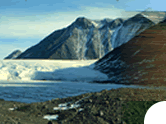Volkmar Wolters studied biology with special
emphasis on zoology and animal ecology. He received a PhD
with a thesis on animal ecology in 1985. He became Associate
Professor at the University of Goettingen and then, Chair
of ecology at the University of Mainz in 1993. Since late
1994, Wolters has been head of the Department of Zoology
at the University of Giessen leading the animal ecology
group. He has been engaged in animal ecology and ecosystem
research over the past 20 years. He has long-term ecosystem
research experience as the coordinator of the soil ecology
group at the Forest Research Centre Göttingen, FRG (1989-1993)
and as a coordinator of the Environmental Research Centre
Mainz, FRG (1992-1994). He is member of the Scientific
Steering Committee of IGBP-GCTE and leader of GCTE activity
4.2. (Global change effects on biodiversity), which is also
part of DIVERSITAS (programme element 1). He has recently
been appointed as a coordinator of a large biodiversity programme
(BIOLOG) funded by the German Government.
Volkmar Wolters expertise is in invertebrate diversity,
animal/microbial interactions, landscape ecology, and ecosystem
research. He has coordinated projects such as GLOBIS and
DEGREE within the 4th framework of the EU, participated in
CANIF (4th framework) and now participates in FORCAST (5th
framework, part of CARBOEUROPE Cluster). The Department of
Animal Ecology runs several ecosystem scale experiments across
Europe and in Germany. Wolters currently runs seven funded
projects. Two projects funded by the German Research Council
(DFG) and another project funded by the German Ministry of
Science (BMBF). One DFG project focuses on the effect of
soil biota on plant resistance to stress (SAR Research Group).
Together with three colleagues, he has recently succeeded
in applying for the DFG Schwerpunktprogramm entitled, 'Stabilization
of organic substances in soil: mechanisms and regulation.'
Within this programme he runs a project on the stabilization
of organic substances by soil biota. Another BMBF project
led by Wolters is on soil biodiversity and sustainable forestry.
Dauber J, Wolters V (2000) Microbial activity and functional
diversity in the mounds of three different ant species. Soil
Biology & Biochemistry 32, 93-99.
Dauber J, Wolters V (2000) Species richness of ants in
the land use mosaic of a marginal landscape. Mitt. Dtsch.
Ges. allg. angew. Ent. 12, 281-284. (German
with English summary)
Pfaff S, Wolters V (1999) The impact of agricultural management
on diurnal lepidopteran communities in a mosaic landscape. EcoSys
Suppl. Bd. 28, 159-167.
Hooper DU, Bignell DE, Brown VK, Brussaard L, Dangerfield
JM, Wall DH,. Wardle; DA Coleman DC, Giller KE, Lavelle
P, van der Putten WH, de Ruiter PC, Rusek J, Silver WL,
Tiedje JM, Wolters V (2000) Interactions between above
and belowground biodiversity in terrestrial ecosystems:
patterns, mechanisms, and feedbacks. BioScience 50,
1049-1061.
Potthoff M, Joergensen RG, Wolters V (2001) Short-term
effects of earthworm activity and straw amendment on the
microbial C and N turnover in a remoistened soil after
summer drought. Soil Biology & Biochemistry 33,
583-591.
Troumbis A, Beier C, Wolters V, Peter D: Terrestrial ecosystem
research in Europe: Lessons from the European Union's research
policy 1996-2001. Environmental Science & Policy, in
press
Wolters V (2000) Invertebrate control of soil organic
matter stability. Biology and Fertility of Soils 31,
1-19.
Wolters V, Silver WL, Bignell DE, Coleman DC, Lavelle
P, van der Putten WH, de Ruiter PC, Rusek J, Wall DH, Wardle
DA, Brussaard L, Dangerfield JM, Brown VK, Giller KE, Hooper
DU, Sala O, Tiedje JM, van Veen JA (2000) Effects of global
changes on above- and belowground biodiversity in terrestrial
ecosystems: Implications for ecosystem functioning. BioSience 50,
1089-1098.
Wolters V, Pflug A, Taylor AR, Schroeter D: Diversity
and role of the decomposer food web. In: Schulze E-D (ed)
Carbon and Nitrogen Cycling in European Forest Ecosystems. Ecological
Studies 142, Springer-Verlag, Heidelberg, pp.
366-381.
